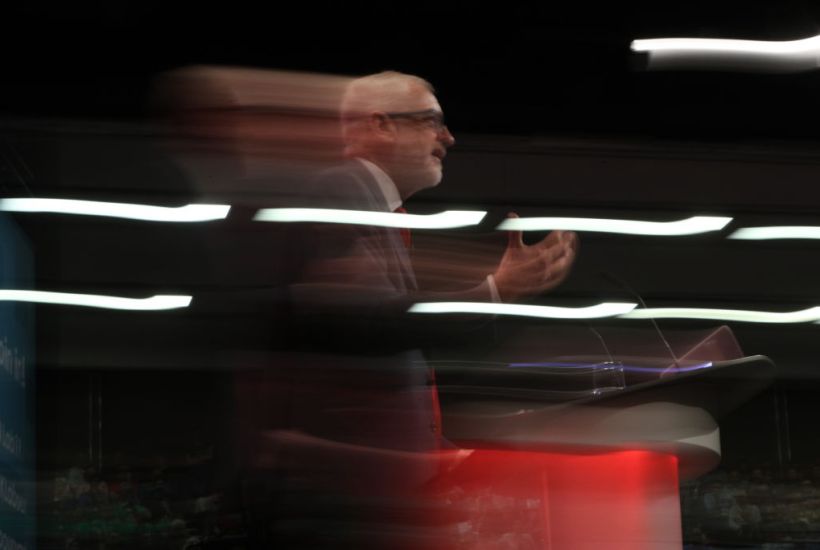Did Labour’s conference help or hinder Jeremy Corbyn’s chances of becoming prime minister? For some, Corbyn ended up stronger than ever. There will be a review of the post of deputy leader, one likely to see the authority of Tom Watson, his severest internal critic, greatly diminished. Corbyn also won a critical vote on Brexit which endorsed his position of neutrality going into a general election. The conference also passed a raft of policies that confirm support in the party for Corbyn’s desire to dramatically extend state intervention in the cause of promoting economic growth, greater equality and tackling climate change. As John McDonnell, the ultimate architect of the party’s enthusiastic re-embrace of the state, told delegates, Labour’s ambition is to ‘lay the foundations of a new society, foundations so deeply rooted that the Tories can never break them up.’
This triumphalism however obscures a deeper truth. Whatever conference voted for in Brighton, Corbynism – the transformative project which was going to turn Labour from a conventional social democratic party into a radical social movement – has stalled.
This was obvious before delegates gathered in Brighton. Labour has not recovered from the shock of the local and European elections which saw it haemorrhage votes to parties with a clear Remain position, the Liberal Democrats especially.
In recent polls, it usually trails the Conservatives, sometimes by as much as ten per cent. Party membership has also been in decline for some time and might now be as low as 400,000, while the hoped-for activism at the grass-roots has not materialised on a significant scale.
The most tangible sign of Corbynism’s limitations on the ground has however been the failure of supporters to trigger the deselection of Corbyn’s greatest critics in the Commons. This means that whatever the result of the next election, most Labour MPs will be Corbyn-sceptics. More worryingly for the Labour leader, he won the Brexit vote in the face of opposition from many of his own partisans and was forced to turn it into a vote of confidence in his leadership. Even then, some called foul at the arm-twisting. Jon Lansman, whose Momentum normally serves as the leader’s Praetorian Guard, made public his criticisms of the process. The MP Clive Lewis, who fought hard for Labour to commit to Remain despite once being a keen Corbynite went much further, declaring his disillusion with his leader and calling for a new kind of radical movement in the party.
Divisions between Corbyn’s top advisors also emerged when news of the resignation of Andrew Fisher, the leader’s policy chief and long-time confidant, leaked to the press. Fisher’s resignation note reportedly complained of a ‘lack of professionalism, competence and human decency’ within Corbyn’s office but even more damningly admitted he believed Labour could not win the next election.
While an imminent election cast its shadow over Labour’s conference nobody was quite sure when it would be held. The likeliest scenario however is that Boris Johnson will resign after failing to get a deal at the EU’s 19 October summit leading a temporary government to extend the Brexit date till January as a precursor to calling an election. In those circumstances, thanks to winning his vote at conference, Corbyn will present himself as the man of reason standing between the Conservatives and the Liberal Democrats, the two implacable parties of Leave and Remain. He will offer voters the chance to vote in a confirmatory referendum on a Labour Brexit deal which he hopes to conclude in three months. Labour as a party – and he as its leader – will however contest the election uncommitted to a Leave or Remain position. The many Labour Remainers figure this an electorally disastrous position, believing that to be neutral about Brexit, when Britons consider it the most important issue facing the country, would see Labour lose votes to the Liberal Democrats and Greens.
But as Len McCluskey, General Secretary of Unite and a key Corbyn ally, told conference, summing up the Corbynite credo: ‘Whether you are Leave or Remain matters less than your class’. Corbyn believes that the radical policies passed by conference will persuade voters of this, that Brexit is a relatively unimportant and passing issue compared to taking on capitalism.
This is a huge judgement call. If the strategy endorsed by conference at Corbyn’s behest fails to take Labour into office he will have nowhere to hide, having already alienated many of his Remain-inclined supporters. But given the vagaries of first-past-the-post, it might just work. The rollercoaster that is Britain’s Brexit crisis suggest we should not write off Jeremy Corbyn, just yet.
Steven Fielding is professor of political history at the University of Nottingham and is writing The Labour Party from Callaghan to Corbyn, for Polity Press
Got something to add? Join the discussion and comment below.
Get 10 issues for just $10
Subscribe to The Spectator Australia today for the next 10 magazine issues, plus full online access, for just $10.




















Comments
Don't miss out
Join the conversation with other Spectator Australia readers. Subscribe to leave a comment.
SUBSCRIBEAlready a subscriber? Log in